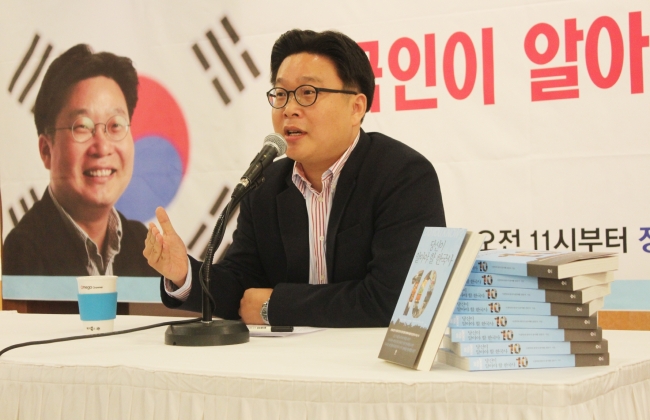Korea promoter presents 10 things people should know about Korea
By Korea HeraldPublished : Nov. 12, 2013 - 19:28

Seo Kyoung-duk, a professor of General Education at Sungshin Women’s University, well-known for his efforts for promoting Korea’s position on sovereignty over the Dokdo Islets, and has recently published a book titled, “Do you Know? 10 Things you Must Know About Korea.”
Seo, who is known for his efforts to promote Korean culture, has selected a wide range of issues, historical moments and cultural aspects that he feels must be known about the peninsula including: the Dokdo Islets (listed as the most important issue), the “comfort women,” Japan’s Yasukuni Shrine, Hangeul and Arirang, among others.
“This book is a compilation of what I think are the 10 most important issues that people, especially Koreans, must know about this country,” said Seo at a press conference held in central Seoul on Tuesday. “As you all may well know, Koreans are automatically trained to say, ‘Dokdo Island is ours’; however, when they are asked why, hardly anyone actually knows the historical reasons why, nor can most of them cite any reasonable explanations regarding the issue.”
In order to encourage people to learn about these important aspects of Korea, Seo decided to take a more cultural rather than a political approach when writing this book to make it both simple and enjoyable to read; especially for young people who may be unaware of many of the issues.
Hoping to garner a more global interest in Korea, Seo expressed his intentions to also have the book translated into English, thinking that his new approach discussing Korea’s rich historical background and controversies will be more appealing to non-Koreans.
On the hot-button issue of the Dokdo Islets, Seo argues that instead of preaching to the world with chants about how the remote islets belong to Korea, there are more effective and subtle approaches. For example, promoting more travel to Korea through messages such as, “Come to Korea for travel, we are a country of many beautiful islands ... including Dokdo.”
“In terms of making both Koreans and those outside of Korea aware of this particular issue, I feel that it’s best to focus on it from a cultural aspect,” said Seo. “Why? Because from a historical perspective, there is no question that the island belongs to Korea.”
By Julie Jackson (juliejackson@heraldcorp.com)
Seo, who is known for his efforts to promote Korean culture, has selected a wide range of issues, historical moments and cultural aspects that he feels must be known about the peninsula including: the Dokdo Islets (listed as the most important issue), the “comfort women,” Japan’s Yasukuni Shrine, Hangeul and Arirang, among others.
“This book is a compilation of what I think are the 10 most important issues that people, especially Koreans, must know about this country,” said Seo at a press conference held in central Seoul on Tuesday. “As you all may well know, Koreans are automatically trained to say, ‘Dokdo Island is ours’; however, when they are asked why, hardly anyone actually knows the historical reasons why, nor can most of them cite any reasonable explanations regarding the issue.”
In order to encourage people to learn about these important aspects of Korea, Seo decided to take a more cultural rather than a political approach when writing this book to make it both simple and enjoyable to read; especially for young people who may be unaware of many of the issues.
Hoping to garner a more global interest in Korea, Seo expressed his intentions to also have the book translated into English, thinking that his new approach discussing Korea’s rich historical background and controversies will be more appealing to non-Koreans.
On the hot-button issue of the Dokdo Islets, Seo argues that instead of preaching to the world with chants about how the remote islets belong to Korea, there are more effective and subtle approaches. For example, promoting more travel to Korea through messages such as, “Come to Korea for travel, we are a country of many beautiful islands ... including Dokdo.”
“In terms of making both Koreans and those outside of Korea aware of this particular issue, I feel that it’s best to focus on it from a cultural aspect,” said Seo. “Why? Because from a historical perspective, there is no question that the island belongs to Korea.”
By Julie Jackson (juliejackson@heraldcorp.com)
-
Articles by Korea Herald


![[AtoZ into Korean mind] Humor in Korea: Navigating the line between what's funny and not](http://res.heraldm.com/phpwas/restmb_idxmake.php?idx=644&simg=/content/image/2024/04/22/20240422050642_0.jpg&u=)
![[Exclusive] Korean military set to ban iPhones over 'security' concerns](http://res.heraldm.com/phpwas/restmb_idxmake.php?idx=644&simg=/content/image/2024/04/23/20240423050599_0.jpg&u=20240423183955)



![[Graphic News] 77% of young Koreans still financially dependent](http://res.heraldm.com/phpwas/restmb_idxmake.php?idx=644&simg=/content/image/2024/04/22/20240422050762_0.gif&u=)
![[Herald Interview] Why Toss invited hackers to penetrate its system](http://res.heraldm.com/phpwas/restmb_idxmake.php?idx=644&simg=/content/image/2024/04/22/20240422050569_0.jpg&u=20240422150649)






![[Exclusive] Korean military to ban iPhones over security issues](http://res.heraldm.com/phpwas/restmb_idxmake.php?idx=652&simg=/content/image/2024/04/23/20240423050599_0.jpg&u=20240423183955)



![[Today’s K-pop] Ateez confirms US tour details](http://res.heraldm.com/phpwas/restmb_idxmake.php?idx=642&simg=/content/image/2024/04/23/20240423050700_0.jpg&u=)